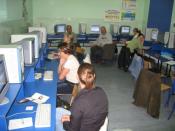ROLE REVERSAL: AN EFFECT OF TECHNOLOGICAL ADVANCEMENT In the article ?Children of the Information Age: A Reversal of Roles?, Edna Aphek pointed out several factors as well as points of view focusing on the ethical, social and educational impacts that technology has brought to our daily life. Doubtlessly, many of these impacts are not only vague, but they are also so well blending into our life that one at first may not realize them at all. One of these hard to pinpoint impacts is probably the child-adult role reversal.
By stated, ?New means of information and communication have caused a radical shift in the role and status of children??, Edna Aphek started his article by comparing the four generations of children: his mother?s, his own and his own kids? and his grandkids?. To Aphek, the first three generations had been growing up in somewhat the same way with very little or no changes in how they learnt, how they responded to their living environment, and how they interacted with others.
However, with the latest generation, which he referred to as the ?new children?, there are tremendous changes. He suggested these changes are directly resulted from numerous advances in technology, especially the evolution of the ?Information Age? (?The impact of technological inventions, especially those connected with information and communication, are far-reaching on socialization, ways of thinking, and modes of learning?) Upon introducing two diverse viewpoints from different people, Aphek emphasized these changes in roles of adults and children resulted from technological advancement are universal and inevitable, regardless whether these changes are considered as favorable or unfavorable, positive or negative. One of such viewpoints is from Neil Postman ??who think of the youth of the Information Generation as the children of television, computer games and video games [Neil Postman, The Disappearance of Childhood, 1982]. Postman's child is one who lost his childhood but never reached maturity. Postman describes a society in which children and adults watch the same movies and tele-romances (soap operas), listen to the same pop music, and play the same computer games.? In such a society, while the adults become more and more childish by trying to pursue the youth culture, the children become more and more mature by exploring the adult?s world. However, these kids are mature only externally but not emotionally. By unfolding the world of adulthood to their young ones, Postman suggests that the adult should control the content, the dosage and the timing of adulthood exposure to these children, or else the very essence of childhood will gradually disappear.
As Aphek mentioned, Postman?s view of these changes in roles are negative and unfavorable because once ?the differentiating line between the child and adult becomes blurred, concepts that distinguish the adult from the child, such as independence and responsibility, become unclear too. Postman describes a society at risk, living in a sinking world without books, without order; a chaotic meaningless world.? In contrast, Don Tapscott?s point of view is in many ways quite the opposite of Postman?s. Upon examining "the first generation to be bathed in bits since birth" in his book Growing Up Digital, Tapscott points out that besides being technological masters, children of the Information Age also ?love to learn. They are curious, inquisitive, studious and responsible.? However, these children might learn in unorthodox ways. They don't necessarily study the curricula written by adults. ?The high-tech children learn differently. They take responsibility over themselves and their learning, are full of initiative, and are willing to give of their knowledge to others. Tapscott's children are caring, outspoken and aspire to improve reality.? He also points out that whereas the Postman?s TV child is passive, computer-and-Internet children are active and creative. He claims ?that because of their access to the digital media these young people learn, work, think, shop and create in ways different from those of their parents. The computer and the Internet are like a playground for these children. For them the Internet is the land of limitless possibilities and opportunities. From different parts of the globe, people and youngsters come to the new land in which sound, music, picture, animation and text are intertwined. In lands of immigration, the young ones are the first to integrate in the new society and to speak its language. Very often they teach their parents and even grandparents the language and customs of the new land.? To Tapscott, this reversal of roles is positive and favorable.
In a perfect world, everything is always clear and distinct. Something can be either good or bad, favorable or unfavorable, positive or negative but it can never be both at the same time. However, since we are not living in such a perfect world, everything that we see will always contain mixed values. So does the technology driven adult-child role reversal. Take the Internet for example. With virtually unlimited information resources and tools that enable students to communicate, solve problems, and publish the results of their work, the Internet is being used as an effective learning tool by more and more children every day. Soon enough, these young children will become proficient in computer and Internet usage. It is not uncommon today for kids to know more about the Internet and computers than their parents, or even their teachers. A lot of parents heavily rely on their kids to ?show? them how to use a computer to achieve a particular task or how to get on the Internet. This role reversal could enhance parents / kids relationship. However, it could also destroy and/or disintegrate the current relationship if those kids ever become impatient or disrespectful to their parents during the course of tutoring. On one hand, with the Information Superhighway widely open and readily available, plus the free time a typical kid has on hand, he or she can explore the cyber world and learn a lot more than what is being taught at school. On the other hand, the contents in which kids are exposed to while surfing the Internet are not always educational, useful or helpful. Some websites even contain harmful information, not to mention those dangerous chat rooms. Unfortunately, children do not always realize the dangers they are exposed to when they are traveling on the Information Superhighway. And it?s up to the parents to educate them, to advice them and to tell them what they should avoid. This situation in and of itself is a conflict. To the children, it doesn?t make any sense that the people being tutored are now telling the tutors what to do? In contrast, on the parents? side, when they were growing up, there were certain activities being considered commonplace and others taboo, based on some unwritten set of rules. By the time they grow up and have children of their own, even though the society has changed, they are still applying that same old set of rules to each and every single decision they make. This makes it seem sometimes ridiculous to their kids since the new generation cannot grow up exactly the same way that their parents did. Because they are living in a different age in which people are operating their lives in a different manner, there always exist a generation gap between parents and children. For example, in the prior generation, children had to write out their papers on a typewriter, did not benefit from the use of calculators, had no access to computers, and could not search the web for information like today?s children. The parents lived in a much less technically oriented era than their children are. This consequently causes a serious strain on the relationship when the parent does not understand this new way of life that their children have engaged themselves in and ultimately will result in parents/kids misunderstanding and conflicts. Another illustration is that these new children are obtaining their computer skills at school. They have easy access to computers and find them interesting and fun to use. Parents have very little or no control over their children while they are at school. More often their children are being influenced by their teachers, peers, and the technology, which they are being trained to use. When kids return home from school talking about what they did on the computer that day, their computer illiterate parents have no ability to understand what their child is saying. It is rather embarrassing and disturbing for parents when their child of only ten years knows vastly much more than they do about computers. There is a role reversal here where the child becomes the teacher and the parent the student. If the parents and their children can get along and understand each others, they both can benefit from this role reversal. Therefore, rather than being hampered by this role reversal, parents can use their children?s knowledge to improve their technological skills as well as to discuss the need for safety on the Internet. Parents should also be open and inquisitive about their child?s Internet habits in order to help them in recognizing danger on the Information Superhighway. By following some simple, commonsense tips that are widely available in many media resources, users of all ages can enjoy this marvelous and exiting medium. The Internet is a wonderful place to learn and explore. But just like any roadway, safe driving on the Information Superhighway requires knowing the rules of the road.





